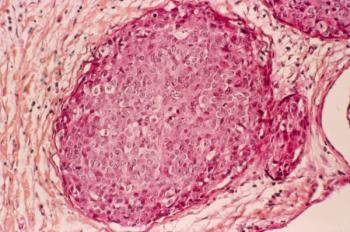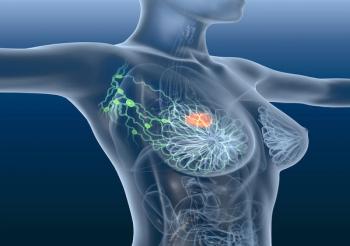
Breast Cancer
Latest News

Latest Videos

More News

A large-scale study suggests increased light at night exposure is linked to a higher risk of breast cancer, particularly in Asian populations and women with estrogen receptor-positive tumors (ER+).

Early research suggests ozone therapy may fight breast cancer cells and lessen adverse effects for patients undergoing treatment, but more research is necessary.

A study of patients diagnosed with early breast cancer during the COVID-19 pandemic found that the public health crisis did not produce significant changes in or delays treatment, despite many women presenting with palpable tumors.

Multigene assays allow for patients to receive personalized breast cancer treatment by identifying promising therapeutic targets, which could improve patient clinical outcomes in the long term and help providers better understand tumor biology.

Sisters of women with high breast cancer risk share similar risk factors, including high polygenic scores, benign breast disease history, and denser breast tissue.

Douglas K. Marks, MD, is a breast medical oncologist and director of the Clinical Trials Office, Perlmutter Cancer Center, NYU Langone Hospital—Long Island, as well as associate professor in the Department of Medicine at NYU Grossman Long Island School of Medicine. As a phase 1 clinical trialist, he sees both patients with breast cancer and those who are looking to receive innovative treatments for their early-stage disease.

Swedish women with prior false-positive mammograms, particularly those aged 60 to 75 with prior biopsies and low density, show elevated breast cancer risk, necessitating closer monitoring and better screening.

Non-Caucasian patients with breast cancer face common influences in surgical decision-making due to fear, misinformation, cultural factors, and power dynamics, highlighting the need for patient-centered surgical decision-making.

Research suggests moderate to vigorous physical activity may help improve cognitive function in breast cancer survivors who have undergone chemotherapy and developed cancer-related cognitive impairment (CRCI).

This year’s top content from the annual San Antonino Breast Cancer Symposium (SABCS) is concentrated in 3 areas: health equity, benign breast disease, and fertility preservation following diagnosis.

The 5-year event-free survival EFS) rate was 81.3% with neoadjuvant pembrolizumab/chemotherapy followed by adjuvant pembrolizumab compared with 72.3% in those who received placebo/chemotherapy plus placebo.

In breast cancer coverage this year, topline results from the phase 3 NATALEE trial made waves in March, with our other most-read content in the space covering an expanded indication for abemaciclib, revised screening recommendations, a new potential treatment to reduce radiation exposure, and the benefits of diet and exercise on patient outcomes.

A combination of KN026, a novel bispecific antibody, and docetaxel elicited responses with an acceptable toxicity profile when administered as neoadjuvant treatment in patients with HER2-positive (HER2+) early or locally advanced breast cancer.

These findings suggest that addressing socioeconomic disparities and inequities that impact access to health care and services may help improve survival outcomes across racial/ethnic groups of male patients with early breast cancer.

Trastuzumab administered subcutaneously delivered unique immunomodulation effects vs intravenous trastuzumab in patients with treatment-naïve HER2-positive (HER2+) breast cancer

This year’s top content from the fall meeting of the Association of Community Cancer Centers (ACCC) highlights both treatment gains made through innovative referral, screening, and assistance initiatives and the ongoing need to improve health equity and research inclusivity.

EG12014, a biosimilar of the anti-HER2 monoclonal antibody trastuzumab, has received a marketing authorization from the European Commission for use in the European Union (EU) for the treatment of patients with HER2-positive (HER2+) breast and metastatic gastric cancer; these are the same indications that trastuzumab holds in the European Union.

Data are scarce on the impact that breast cancer among mothers has on their children and their emotional development due to parenting stress and maternal depression.

The FDA has approved capivasertib plus fulvestrant for the treatment of patients with HR-positive, HER2-negative, locally advanced or metastatic breast cancer harboring 1 or more PIK3CA, AKT1, or PTEN alteration, following progression on at least 1 endocrine-based regimen in the metastatic setting or recurrence on or within 12 months of completing adjuvant therapy.

Investigators note that prospective research is needed to confirm the efficacy of vitamin D supplements in preventing chemotherapy-induced peripheral neuropathy in patients with breast cancer.

Some of these symptoms include breast puckering, nipple discharge, and retracted nipple.

Women of varying backgrounds, educational levels, and marriage status opted for different types of breast reconstruction based on different values.

Rhenium (186Re) obisbemeda (Plus Therapeutics) shows potential to address the unmet need of new treatment options for patients with breast cancer and leptomeningeal metastases and will continue to be evaluated in the ReSPECT-LM program. The orphan drug designation (ODD) was granted on November 3.

Data from 2176 US counties link obesity and higher breast cancer mortality, while also showing varying degrees of association between mortality and access to healthy lifestyle options per social determinants of health (SDOH).

Afreen Shariff, MD, MBBS, Duke Cancer Institute, discusses the challenges and benefits of electronic consults (e-consults) for patients with cancer currently undergoing treatment who have a comorbidity history or who develop an endocrine system disorder because of treatment.














